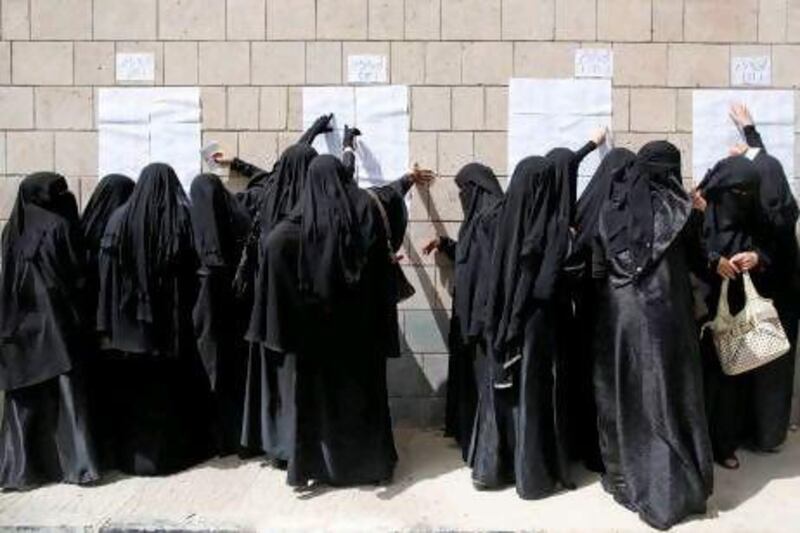SANAA // Zine El Abidine Ben Ali fled Tunisia. Hosni Mubarak was replaced by Egypt's generals. Libyan rebels shot Muammar Qaddafi. Yesterday Ali Abdullah Saleh became the fourth Arab ruler to be deposed by a popular uprising, but the first to bow out voluntarily.
Yemen's voters ended the president's 33-year rule and elected his unchallenged successor under a Gulf-brokered peace deal.
The manner of Mr Saleh's departure is certain to be noted in Syria, where Bashar Al Assad struggles to stay in power in the face of growing international opposition and a slide into civil war.
The only president Yemen has had, Mr Saleh leaves to his successor and former vice president, Abdrabu Mansur Hadi, a nation deeply riven by political and ethnic division and in dire economic straits.
That was evident yesterday as Houthi rebels in the north boycotted the election and southern separatists disrupted it. Half the polling centres in the port city of Aden were forced shut by members of a coalition calling for a day of civil disobedience.
An election commission official said nine of 301 voting districts, all in the south, were "crippled" by fighting. At least five people, including two soldiers and a child, died and several were wounded in clashes between security forces and suspected separatists. Voting went more smoothly in Sanaa. Soldiers were deployed across the capital to protect polling stations that opened at 8am to large crowds waiting to stamp their ink-soaked thumbs on the blue-and-white ballot papers bearing the name of the sole candidate - Mr Hadi.
Abdullah Ali, 60, stood in line three hours before voting at a crowded polling station at Sanaa University. "Saleh is out!" he said. "We are so happy because we could not live with this man and all the problems he created for Yemen."
Although voting in the capital was largely without incident, there was tension between the rival cantons carved out by government soldiers and those commanded by Ali Mohsen, the military general who turned against Mr Saleh last year.
The youth demonstrators who sparked the rallies that led to Mr Saleh's departure were also divided over Mr Hadi.
Osama Shamsan, a spokesman for a faction of youth demonstrators, said they had decided neither to oppose nor support the new president.
"People in Yemen have the right to choose, and we won't block their freedom of speech," he said.
"We will wait and see whether Mr Hadi achieves the revolution's objective."
Mr Hadi will be president for a two-year transition to a new political system, including a new constitution.
"This is a historic day and I am happy because it represents a significant move towards a modern, civil Yemen, which will require substantial political, economic and social changes," he said after voting at a polling station near his home in Sanaa.
His temporary administration will have to deal with anger over the deaths of more than 250 people during the demonstrations that erupted last year to oust Mr Saleh, restructure a fractious and corrupt military - a condition for more foreign aid - and repair a shattered economy.
Yemen is wracked by one of the world's worst humanitarian crises, on a par with Somalia.
The south has increasingly been gripped by a separatist fervour some fear could lead to a repeat of the 1994 north-south civil war after unification in 1990.
Yemen's Nobel peace laureate, Tawakkul Karman, urged the incoming government to quickly implement reforms.
"This transition will not pass without the participation of the revolutionaries in monitoring the performance of the interim president and government," she said.
Mr Saleh remains influential and is regarded as a potential obstacle. His family still holds influential posts, including head of the Republican Guard units and dreaded internal security agencies.
Yemen, a nation of 25 million, was already one of the Arab world's poorest countries and the upheaval over the past year has worsened chronic electricity blackouts, fuel shortages and unemployment.
The economic and humanitarian crisis and the tribalism and lawlessness gripping he country have made it a base for Al Qaeda and other militants.
Nevertheless, Yassin Noman, secretary-general of the opposition Socialist Party, is optimistic.
"We have had no state in the real sense of state but, rather, an autocrat," he said of the Saleh regime.
"When his authority was shaken, the result was chaos."
malqadhi@thenational.ae
Follow
The National
on
[ @TheNationalUAE ]
Hugh Naylor on
[ @HughNaylor ]
& Mohammed Al Qadhi on
[ @mohammedalqadhi ]





